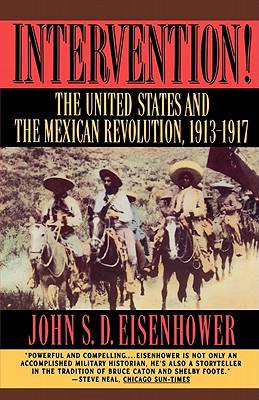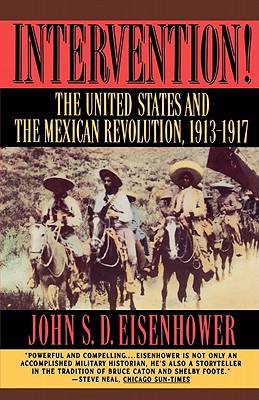
Bedankt voor het vertrouwen het afgelopen jaar! Om jou te bedanken bieden we GRATIS verzending aan op alles gedurende de hele maand januari.
- Afhalen na 1 uur in een winkel met voorraad
- Gratis thuislevering in België
- Ruim aanbod met 7 miljoen producten
Bedankt voor het vertrouwen het afgelopen jaar! Om jou te bedanken bieden we GRATIS verzending aan op alles gedurende de hele maand januari.
- Afhalen na 1 uur in een winkel met voorraad
- Gratis thuislevering in België
- Ruim aanbod met 7 miljoen producten
Zoeken
Intervention
The United States and the Mexican Revolution, 1913-1917
John S D Eisenhower
Paperback | Engels
€ 41,45
+ 82 punten
Omschrijving
In May 1916, six American soldiers led by Lieutenant George S. Patton, Jr., surrounded a building near Rubio, Chihuahua. When the occupants burst out of the door, guns blazing, Patton and his men cut them down. A month later seventy American troopers charged into a strong Mexican position at Carrizal; ten were killed and twenty-three taken prisoner. In 1914, a powerful American naval force seized Mexico's principal seaport, Veracruz, and occupied the city for six months. Yet, all the while, Mexico and the United States were technically at peace.
The United States began its involvement in the Mexican Revolution in 1913 with President Woodrow Wilson's decision to remove Victoriana Huerta, leader of a military junta that overthrew and murdered Mexico's president, Francisco Madero. Diplomatic actions failing, Wilson occupied Veracruz, cutting off Huerta's supplies of arms from abroad. When in 1916 the legendary bandit Pancho Villa raided Columbus, New Mexico, Wilson sent General John J. Pershing into Chihuahua to capture him.
This story leads readers to increased respect for the people of Mexico and its revolutionary leaders--Zapata, Obregon, Carranza, and Pancho Villa. It shows that, while American troops performed well, U.S. intervention had no effect on the outcome of the Mexican Revolution. The American army had a taste of battle and Pershing went on to become the greatest American hero of the First World War.
The United States began its involvement in the Mexican Revolution in 1913 with President Woodrow Wilson's decision to remove Victoriana Huerta, leader of a military junta that overthrew and murdered Mexico's president, Francisco Madero. Diplomatic actions failing, Wilson occupied Veracruz, cutting off Huerta's supplies of arms from abroad. When in 1916 the legendary bandit Pancho Villa raided Columbus, New Mexico, Wilson sent General John J. Pershing into Chihuahua to capture him.
This story leads readers to increased respect for the people of Mexico and its revolutionary leaders--Zapata, Obregon, Carranza, and Pancho Villa. It shows that, while American troops performed well, U.S. intervention had no effect on the outcome of the Mexican Revolution. The American army had a taste of battle and Pershing went on to become the greatest American hero of the First World War.
Specificaties
Betrokkenen
- Auteur(s):
- Uitgeverij:
Inhoud
- Aantal bladzijden:
- 416
- Taal:
- Engels
Eigenschappen
- Productcode (EAN):
- 9780393313185
- Verschijningsdatum:
- 1/07/1995
- Uitvoering:
- Paperback
- Formaat:
- Trade paperback (VS)
- Afmetingen:
- 142 mm x 213 mm
- Gewicht:
- 535 g

Alleen bij Standaard Boekhandel
+ 82 punten op je klantenkaart van Standaard Boekhandel
Beoordelingen
We publiceren alleen reviews die voldoen aan de voorwaarden voor reviews. Bekijk onze voorwaarden voor reviews.












